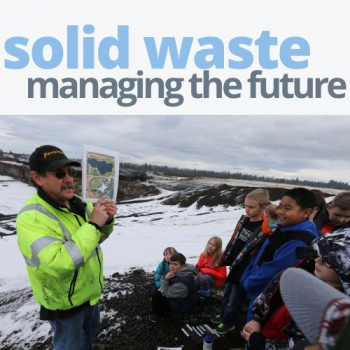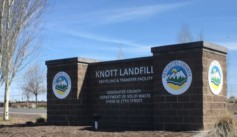Solid Waste Home
The Department of Solid Waste oversees the management of solid waste in Deschutes County. We take pride in providing a safe place for residents to dispose of or recycle unwanted materials.
Knott Landfill Recycling and Transfer Facility is the only landfill in Deschutes County and is estimated to remain open until 2031. For waste disposal in outlying areas of Deschutes County, we operate four transfer stations. These include the Negus Transfer Station located in Redmond, the Northwest Transfer Station near Sisters, the Southwest Transfer Station between Sunriver and La Pine, and the Alfalfa Transfer Station located off Walker Road near Alfalfa.

Knott Landfill can be a busy place, especially during nice weather. To view current traffic conditions at Knott Landfill, check out our cameras here.
The Department of Solid Waste sponsors money-saving recycling and collection events throughout the year. These include Christmas tree recycling, year-round hazardous waste recycling for households and yard debris collection events including the spring Fire Free program.

Knott Landfill Recycling and Transfer Facility is the only landfill in Deschutes County and is expected to be full by 2029. To plan for the future, Deschutes County developed a Solid Waste Management Plan (SWMP) in 2019 to provide a roadmap for meeting the challenges of solid waste management in a growing community. Click here to learn more about the future plans.
Frequently Asked Questions
Collection services are provided to residents and businesses directly by two licensed haulers, Cascade Disposal and Republic Services. They offer waste and recycling services within the city and county and yard debris/food scrap service within city limits only. Contact them for more information or to set up service for your home or business.
Self-haul and businesses can bring waste to Knott landfill or any of the county transfer stations. Construction debris limits apply at some of the transfer station’s locations. Click here for more details.
Secure Your Load and receive a $10 rebate! Use tarps, nets, or straps to keep debris off our roads and protect our community. A small effort makes a big difference for safety and the environment. Secure it right, drive with peace of mind.
There are 5 transfer stations and only one landfill in Deschutes County. Each transfer station seeks to provide safe disposal of waste for county residents and opportunities to conserve resources through recycling opportunities for cardboard, mixed recycling and glass. View the addresses and days and hours of operation here.
All Deschutes County waste, whether received by transfer stations or hauling companies, is currently transported to Knott Landfill, 620 tons per day.
Acceptable materials include any non-liquid, non-gaseous waste material that is discarded from homes or businesses.
Unacceptable materials include hazardous materials or liquids, automobiles or mobile homes, explosives or blasting caps, hazardous waste, or firearms.
Please contact the solid waste office for any questions at (541) 317-3163.
The Hazardous Waste Facility located at Knott Landfill accepts a wide variety of hazardous waste. The facility is open every Friday and Saturday from 9 a.m. – 3 p.m. For more information visit Deschutes County Solid Waste.
Business Hazardous Waste is also accepted at the Hazardous Waste Facility. Businesses must pre-register by completing the Waste Collection Event Application. Businesses must qualify as Very Small Quantity Generator (VSQG). Appointments can be made on Wednesday and Thursday and are required. Please contact the Facility Supervisor to schedule an appointment. Fees are charged based on the type and amount of waste accepted.
https://www.deschutes.org/solidwaste/page/hazardous-waste-management
Clean fill, asphalt rock dirt, brick and ceramic tiles can be accepted at the Negus transfer station for a decreased disposal rate. Any metal (rebar, pie, etc.) embedded in concrete is not to protrude more than 12 inches and the maximum dimension is 3 ft. Concrete can also be disposed of at Knott landfill at the regular disposal rate.
By covering and securing your load, you contribute to a safer, cleaner more responsible community. It can prevent accidents, protect the environment, save money on disposal fees and help avoid fines associated with the County ordinance 13.36.040. Properly covered and secured loads will receive a $10 rebate.
Mixed/commingled recycling accepts various plastic, paper and metal. Check with your service provider for a recycling guide that lists what can be recycled in the blue mixed/commingle recycling cart for your home or business.
Deschutes Recycling, located at Knott landfill, and county transfer stations also accept all materials collected curbside as well as other materials.
Click here for a list of acceptable items and download a recycling guide for your area.
Appliances can be recycled for a fee. Appliances with Freon – limit 4 per customer per day.
Scrap metal can be recycled for free.
Batteries
- Auto and rechargeable batteries can be dropped off for recycling at no charge.
- Single-use alkaline batteries (flashlight, tv remote, etc.) can be dropped off at the drop off recycling depots and can also be disposed of in the regular garbage. Modern single-use dry cell batteries are mercury free and do not contain regulated hazardous constituents.
- Portable rechargeable batteries (NiCad, Lithium ion from tools, cell phones, cameras, etc.) can be recycled at the drop off recycling depots and many major tool retailers and rechargeable device retailers. They can also be accepted at Deschutes County Solid Waste Household Hazardous Waste Facility.
Click here for more information on battery disposal.
Electronics – TVs, monitors, CPU’s, laptops, desktop printers, keyboards and mice can be recycled for free. Other electronic peripherals can be recycled for a fee at Deschutes Recycling, located at Knott landfill.
Deschutes Recycling and country transfer stations also have additional recycling options for yard and wood debris, tires, motor oil, and antifreeze, and more. For a complete list, visit DR recycling guide.
Clean wood waste can be recycled for a fee at Deschutes Recycling located at Knott landfill and at the Negus Recycling Center. Pallets, decking, fencing, crates, dimensional lumber, sheet goods, stained and painted wood are accepted. Treated lumber, laminates or synthetic are accepted as garbage.
In 2022, Oregon became the fourth U.S. state to pass a law creating a statewide mattress recycling program. Senate Bill 1576 requires mattress manufacturers to establish an extended producer responsibility (EPR) program, making it easier for consumers to recycle unwanted mattresses. The Mattress Recycling Council is assisting in creating recycling options as the county works on setting up more robust program.
Mattresses can be accepted at Deschutes Recycling located at Knott Landfill. 4 mattresses per person daily.
Mattresses can also be accepted through on Fridays 8 a.m.- 12 p.m. through August at; On the Move Movers, Moving Company, 1350 SE Reed Market Rd.
Whether a school, business or individual, you can contact us to schedule a field trip, community presentation about waste and recycling or a school assembly. Learn more about field trips to the landfill here.
Deschutes County Partners with the Environmental Center for youth education programs and waste reduction with the Rethink Waste Project. Learn more about their programs here.
No, recycling is not sent straight to landfills. Once your mixed recycling leaves the cart, it’s taken to a local facility where it is baled, then shipped to a materials recovery facility (MRF) in the Portland region. There, the material is sorted into different types of recyclable material (paper, metal, and plastic) that are sent to markets to make new products.
Contamination (items that don’t belong in recycling) is a real challenge. Non program recyclable materials are removed during the post sorting process and landfilled, which costs the recovery facility money. The clean, acceptable recyclable materials are sent to markets both locally and globally.
The Oregon Department of Environmental Quality (DEQ) has a list of the top contamination found in the recycling stream. Know before you throw. Contact your local service provider for a current recycling guide or contact our solid waste office for more information.
Knott landfill is estimated to reach capacity in 2031. To plan for the future, Deschutes County developed a Solid Waste Management Plan (SWMP) in 2019 to provide a roadmap for meeting the challenges of solid waste management in a growing community. The SWMP also assessed disposal options such as alternative technologies, transporting waste to out-of-County regional landfills, and siting a new landfill in Deschutes County. The recommendation was to site and permit a new Solid Waste Management Facility (Landfill) within Deschutes County.
Decomposing waste produces landfill gas, which is primarily composed of methane, carbon dioxide, nitrogen, and oxygen. Between 45% and 60% of landfill gas is made up of methane, which is constantly being flared which emits carbon dioxide into the air.
Deschutes County’s Knott landfill is working in partnership with Cascade Natural Gas Corporation (CNGC) to build a facility that will convert landfill gas into Renewable Natural Gas and inject it into Bend's natural gas distribution system. This initiative is part of broader efforts to manage waste and reduce reliance on traditional energy sources.
For safety and legal reasons, picking or salvaging is not allowed at the landfill. All materials at the landfill are the property of the landfill and all transfer stations.
Medical sharps such as lancets and hypodermic needles from home self-medicating healthcare are accepted free of charge at the Knott Landfill scale house or the transfer stations in Sisters, Redmond and La Pine. The sharps must be in a sealed leak-proof, puncture-proof metal or plastic container (no glass), and must be labeled, "Sharps." These are available for purchase at most pharmacies and medical supply retailers. Please contact the site attendant for disposal directions.
Businesses can contact Republic Services for medical waste collection service.
Check out the Medical Waste Flyer here.
Asbestos containing material (ACM) is accepted at Knott Landfill. Solid Waste Department approval is required at least 24 hours prior to delivery. There is special documentation, handling and packaging requirements for ACM, and requirements vary, depending on the form and condition of the ACM. Advisories and fact sheets on asbestos regulations, safety, handling and other related topics can be found at the DEQ website.
A DEQ ASN-4 form and a Special Waste Application must be submitted to specialwaste@deschutes.org and approved prior to scheduling delivery of asbestos delivery to Knott Landfill. There is a $50.00 charge per application fee. The disposal rate for ACM is $0.06/pound, with a minimum charge of $125.00.
For petroleum contaminated or other contaminated soil, a Special Waste Disposal Application is required to be submitted with the appropriate laboratory analytical reports and approved prior to scheduling delivery to Knott Landfill. There is a $50.00 charge per application fee. The disposal rate for contaminated soil is $0.0225/lbs.

